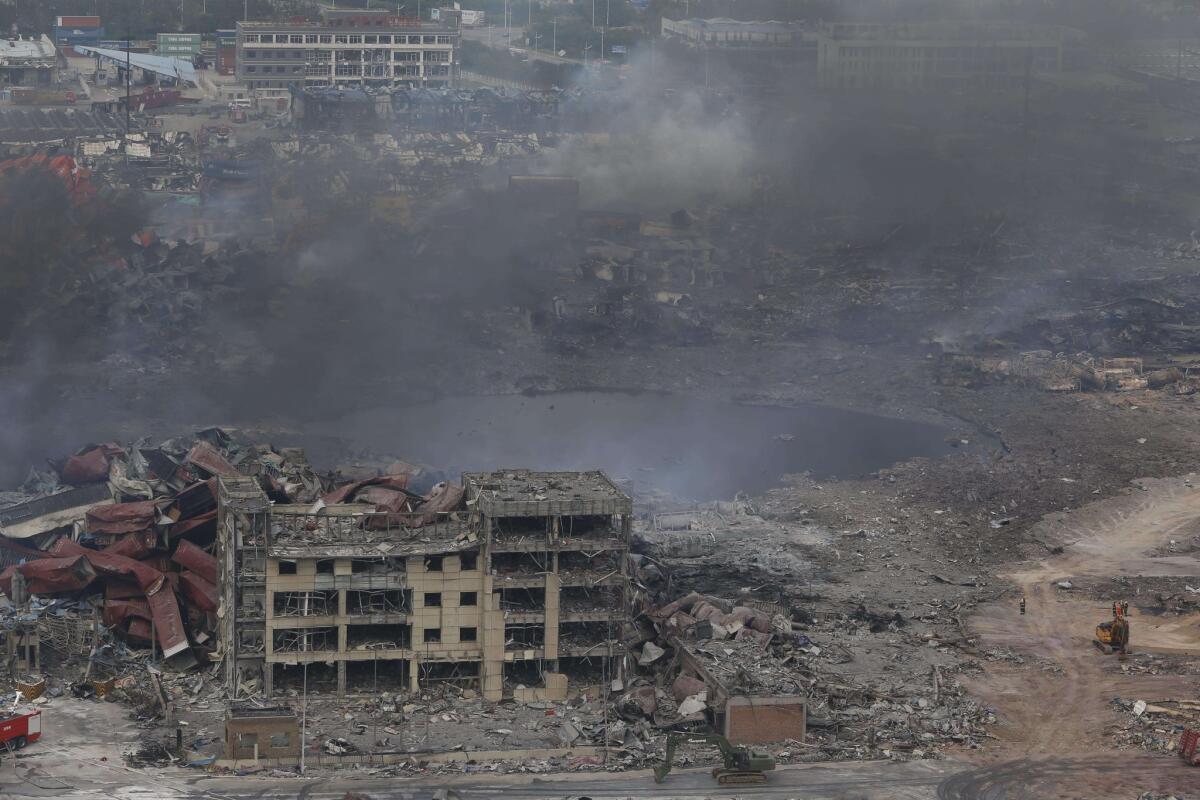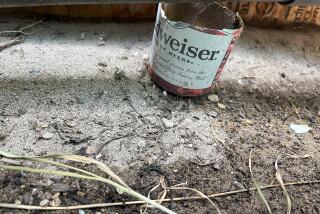Chinese blasts raise questions about having a hazardous site near housing

Smoke rises Friday at the site of an explosion in Tianjin. Chinese authorities struggled to extinguish fires and identify dangerous chemicals at a devastated industrial site, two days after giant explosions killed dozens of people.
- Share via
Reporting from Beijing — On Wednesday afternoon, Tianjin Ruihai International Logistics was just one among countless Chinese industrial firms, a no-name handler of dangerous chemicals in the northeastern port city of Tianjin.
Since Wednesday night, when massive blasts at Ruihai’s seaside facility devastated a swath of Tianjin’s Binhai district, killing at least 85 people, hospitalizing 721, and leaving thousands of nearby residents temporarily homeless, the company has found itself at the center of a public outcry over a perceived lack of transparency and public accountability.
Chinese Internet users have questioned how the facility — which contained a vast array of harmful substances, including cyanide — existed in proximity to several major residential developments and infrastructure projects.
Within walking distance of the site was a soccer stadium, a cloud computing center and housing that included a high-rise complex called Vanke Harbor City. All were extensively damaged by the blasts, their structures bent and their windows shattered.
State media reported that Ruihai’s general manager, Zhi Feng, has been hospitalized with a brain injury sustained in the blasts and is under surveillance by police. Thick smoke continued to rise Friday from the facility’s burned-out remains. Emergency responders found five bodies at the scene during the morning; scores of people are still missing.
Chinese law stipulates that “medium to large” warehouses containing dangerous chemicals must be located at least 1,000 yards away from public buildings and major infrastructure projects, such as a highways, railroads and canals, according to an investigative report in the Beijing News.
Yet at least two local residential developments, including Vanke Harbor City, were located within 1,000 yards of the blasts, the newspaper reported.
The real estate developer Vanke received official permission to build the development in 2010. Ruihai was established in 2011. Two years later, the company applied for official permission to build the warehouses and employed a local institute — the Tianjin Academy of Environmental Sciences — to complete a mandatory environmental impact assessment.
The institute issued 130 surveys to the public and received 128 responses, all of them supportive of the project, Beijing News reported. Yet Vanke, as well as managers at two other nearby developments — Zhongjiao Qihang Home and Wantong New City International — told the Beijing News that they had not received the surveys.
Neither Vanke nor the Tianjin Academy of Environmental Sciences could be reached for comment Friday afternoon.
Authorities have blocked Chinese and foreign reporters from conducting interviews on the scene and censored critical posts on social media.
Many Internet users, frustrated by the lack of an official explanation, have speculated that Ruihai’s relationships with Tianjin officials freed the company from regulatory scrutiny. Some questioned whether Zhi Feng, its general manager, is related to Zhi Weihai, a former deputy mayor of Tianjin who had jurisdiction over the city’s ports. (The two men share an unusual surname). The speculation has not been corroborated.
On Thursday night, many Tianjin residents were still reeling from the explosions.
The explosion “was like an atomic blast,” said an employee at a supermarket about two miles from the blasts.
“I heard three sounds. When I heard the first one, I thought it was a thunder — but I thought the thunder was too loud,” said the employee, who requested anonymity while discussing the sensitive event. “I came out and saw a mushroom cloud. It was so bright, much brighter than even strong sunlight.”
Nearby, another middle-aged man said that he was not yet ready to return home.
“I don’t know where to go tonight,” he said, his arm lacerated by shattered glass. “I’ll either stay outside with other residents or go to a hotel.”
Follow @JRKaiman on Twitter for news out of China
More to Read
Sign up for Essential California
The most important California stories and recommendations in your inbox every morning.
You may occasionally receive promotional content from the Los Angeles Times.










